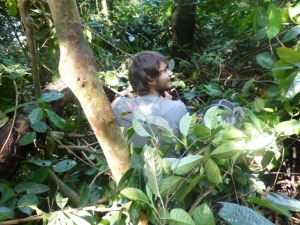HISTORY
The Environment and Rural Development Foundation (ERuDeF) International Volunteering Program (IVP) is an Initiative of ERuDeF Institute of Biodiversity and Non-profit Studies (EIBiNS) instituted in 2008 initially to raise the international awareness and funding for the conservation of great apes (Cross River gorillas and the Nigerian-Cameroon chimpanzees) in the Lebialem Highlands, Southwest Cameroon. This has been extended to include birds and butterfly conservation, reforestation, community development and other forms of eco-tourism in the other parts of western and littoral Cameroon. The project recruits volunteers, between 18 and 70, from all over the globe who spend from two weeks to several months in these areas supporting the conservation of wildlife and other forms of biodiversity in Cameroon. Volunteers come from North America, Europe, Asia, India, and Australia.
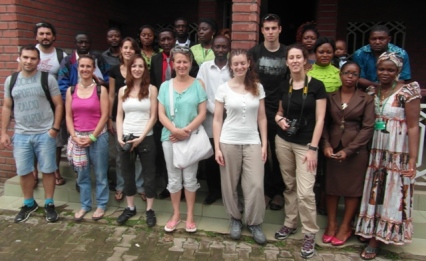
Volunteers and Staff at ERuDeF Head Office in Buea
GOAL
IVP is out to enhance the sustainable management of biodiversity and long term conservation of endangered apes (cross river gorilla and Nigeria-Cameroon Chimpanzee) through the provision of human, financial and material resources to support local livelihoods, development and education.
WILDLIFE CONSERVATION:
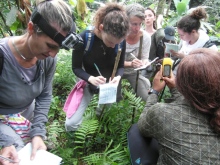 This involves trekking through and camping in the forest to record observations, including information about nesting signs, direct sightings, vocalization, feeding signs and tracking of the critically endangered Cross River Gorillas, Nigerian-Cameroon Chimapanzees, African Forest Elephants, Drills etc. The sites for this programme are the Lebialem Highlands, in South West Cameroon and the Dja Reserve-a UNESCO heritage site in Southern Cameroon
This involves trekking through and camping in the forest to record observations, including information about nesting signs, direct sightings, vocalization, feeding signs and tracking of the critically endangered Cross River Gorillas, Nigerian-Cameroon Chimapanzees, African Forest Elephants, Drills etc. The sites for this programme are the Lebialem Highlands, in South West Cameroon and the Dja Reserve-a UNESCO heritage site in Southern Cameroon
BIRDS WATCHING:
 Birds watching is carried out to detect and identify different species in their natural environment . Sites for this programme are the Mt Cameroon National Park, which is home to over 210 bird species with two strictly endemic species, the Lebialem Highlands with over 480 bird species, 18 of which are IUCN listed, Mt Kupe and Rumpi Hills.
Birds watching is carried out to detect and identify different species in their natural environment . Sites for this programme are the Mt Cameroon National Park, which is home to over 210 bird species with two strictly endemic species, the Lebialem Highlands with over 480 bird species, 18 of which are IUCN listed, Mt Kupe and Rumpi Hills.
BUTTERFLY CONSERVATION:
 This involves observing the colourful and blissful varieties of butterflies in the Lebialem Highlands, identifying and detecting the different species
This involves observing the colourful and blissful varieties of butterflies in the Lebialem Highlands, identifying and detecting the different species
MOUNTAIN TOURISM (HIKING AND RACING):
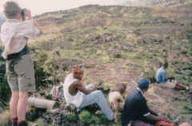 It has to do with running alongside nationals to the highest peak of West and Central Africa during the Mt Cameroon Race of Hope in February of each year. It also involves trekking and nature discovery tour to the beautiful landscape of Mt Cameroon, Mt Bamboutos, Mt Oku and other sites
It has to do with running alongside nationals to the highest peak of West and Central Africa during the Mt Cameroon Race of Hope in February of each year. It also involves trekking and nature discovery tour to the beautiful landscape of Mt Cameroon, Mt Bamboutos, Mt Oku and other sites
HOME STAY AND CULTURAL CONSERVATION:
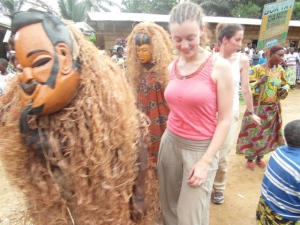 Living in local communities/working with the locals to conserve their endowed rich cultural diversity manifested by a rich and diverse folklore, music, arts, habitats and ways of life is the focus of this programme. It involves visiting palaces and museums like the Bafut, Mankom, Bali, Nso, Kom, Babungo Palaces, participating in cultural/traditional manifestations and having a feel of the African traditional dishes.
Living in local communities/working with the locals to conserve their endowed rich cultural diversity manifested by a rich and diverse folklore, music, arts, habitats and ways of life is the focus of this programme. It involves visiting palaces and museums like the Bafut, Mankom, Bali, Nso, Kom, Babungo Palaces, participating in cultural/traditional manifestations and having a feel of the African traditional dishes.
EX-SITU CONSERVATION IN LIMBE ZOO & BOTANICAL GARDEN:
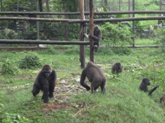 This involves hands-on animal care at the Limbe Wildlife Centre to some 15 primate species including gorillas , chimpanzees, drills, mandrills, baboons and visit to the Limbe Botanic Garden to observe hundreds of species of domesticated wild plants.
This involves hands-on animal care at the Limbe Wildlife Centre to some 15 primate species including gorillas , chimpanzees, drills, mandrills, baboons and visit to the Limbe Botanic Garden to observe hundreds of species of domesticated wild plants.
LANDSCAPE CONSERVATION:
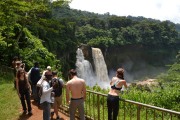 This programme involves guided tours to major lakes and water falls in Northwest Cameroon like Lake Awing, Nyos, lake Oku, lake Wum and the Menchum Fall; in the Western Region like the Ekom-Ekam Water Fall and in Southwest Cameroon like Lake Barombi.
This programme involves guided tours to major lakes and water falls in Northwest Cameroon like Lake Awing, Nyos, lake Oku, lake Wum and the Menchum Fall; in the Western Region like the Ekom-Ekam Water Fall and in Southwest Cameroon like Lake Barombi.
REFORESTATION AND LANDSCAPE RESTORATION:
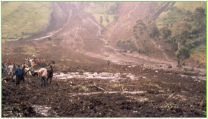 This has to do with the promotion of tree planting in the Western Highlands of Cameroon. It involves active participation with the locals in planting agroforestry tree species in either farmers’ fields or water catchments. Tree nurseries and seed bank are also established. This part of the project adds in improving soil fertility, increasing farm yield for the local people and saving fragile landscapes.
This has to do with the promotion of tree planting in the Western Highlands of Cameroon. It involves active participation with the locals in planting agroforestry tree species in either farmers’ fields or water catchments. Tree nurseries and seed bank are also established. This part of the project adds in improving soil fertility, increasing farm yield for the local people and saving fragile landscapes.
COASTAL RESOURCE CONSERVATION:
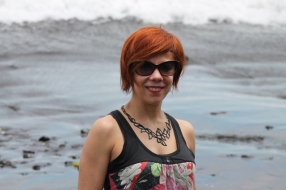 This programme takes you to Cameroon best beaches and wetlands. You get to visit the Kribi in Southern Cameroon and the Seme Beach in Limbe-Southwest with fine sand, crystal clear water with fresh fish and cold beer to freshen you. Then the marine turtle and frogs wetlands in Tiko, Limbe and Kribi
This programme takes you to Cameroon best beaches and wetlands. You get to visit the Kribi in Southern Cameroon and the Seme Beach in Limbe-Southwest with fine sand, crystal clear water with fresh fish and cold beer to freshen you. Then the marine turtle and frogs wetlands in Tiko, Limbe and Kribi
CONSERVATION EDUCATION:
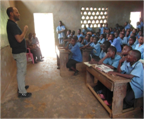 Conservation education is conducted in the local schools and communities. Children are taught about wildlife conservation and environmental protection Contests for the children are organised and prizes awarded. The community education is focused on a similar topic with the local communities.
Conservation education is conducted in the local schools and communities. Children are taught about wildlife conservation and environmental protection Contests for the children are organised and prizes awarded. The community education is focused on a similar topic with the local communities.
WHEN TO VOLUNTEER
Groups and individuals are recruited all year round but the expedition is more convenience and terrain more physically doable in the dry season (October to April) than in the rainy season (May to September);
WHAT VOLUNTEERS DO
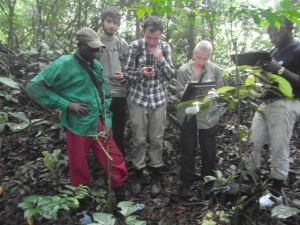 Volunteers/ecotourists focus on great apes surveys or any programme they signed in for and education and awareness raising activities. A sampling design is established prior to the start of the surveys and volunteers/ecotourists are drilled on data collection
Volunteers/ecotourists focus on great apes surveys or any programme they signed in for and education and awareness raising activities. A sampling design is established prior to the start of the surveys and volunteers/ecotourists are drilled on data collection
Techniques by ERuDeF Biologists and former local hunters employed by ERuDeF as field guides. Life during this period is more or less nomadic; Volunteers/ecotourists leave the camp site each day for a 7 hour traking, recording vital apes data with the help of field guides and ERuDeF Biologist. You trek up and down steep and gentle slopes as you follow family groups of gorillas and chimpanzees. Data collected includes; nest sites, signs of feeding and habitat use, documenting observations through photography and GPS coordinates. You may encounter other endangered primates and hundreds of bird species and other wildlife.
Education and awareness raising will form a key part of this expedition. This is because parents in forests adjacent communities belief more in their children than experts from ERuDeF thus Changing their mind set towards great apes conservation is very indispensable for the short and long term protection of apes. At this level, volunteers are trained on during and orientation session after which they, with the aid of the ERuDeF Education for Sustainable Development Coordinator, go to schools and communities raising awareness on the ecology and behaviour of apes (Nigerian Cameroon Chimpanzee, the cross river gorilla etc) and the urgent need for their conservation.
SYNOPSIS OF EXPEDITION
(Case of a four-week volunteer who signs up for our Conservation Programme in the Lebialem Highlands)
Day one: Pick up
An ERuDeF staff will be available at the airport with a card bearing the name of the volunteer. He/she will be outside waiting because of entry restrictions and volunteers are advised to always come outside. The volunteers luggage is packed into the ERuDeF truck and after a two to three hour drive, he or she is lodged at a hotel in Buea (Hotel Carlos) where he spends the night. The volunteer is handed an information package containing vital information about the entire expedition.
Volunteers are advised to always use the Douala International Airport. This is because of its proximity to the head quarter of the organization (about 2 hours) and the project sites.
.Day Two: Orientation
This one of the most preponderant part of the programme. As it gives the volunteer some guidelines that will help him/her through the entire expedition. It is characterised by the Presentation of ERuDeF/programmes and activities; field realities and what the organization expects from the the volunteer/ecotourist; discussion of field plan and expedition objectives. The volunteer is also given the opportunity to do some desktop study of apes (cross river gorillas and Nigeria Cameroon Chimpanzees) that is their ecology/behavioural patterns and threats they are exposed to.
Day Three and Four : Departure to the Field
Volunteers/ecotourists and ERuDeF IVP staff are expected to organise and pack their bags into the field truck or take them to the bus station in case the field truck is not available.
Volunteers could leave some of their luggage not needed in the forest either in ERuDeF office in Buea or in local communities in order to avoid excess luggage in the forest. Volunteers are also expected to carry minimum luggage while hiking into the forest.
Travelling duration vary with the project sites:
1. proposed Bechati – Mone corridor
– Buea to Bamenda = 6-7hours
– Bamenda to Bokwa = 2hours
– Bokwa, Mile 29 to forest base = 2 hours
2. Tofala Hill Wildlife Sanctuary
– Buea to Menji through Dschang = 7-8hours
– Menji to Fossimondi = 1h.30mins
– Fossimondi village to forest base = 4hrs
– Menji to Besali, Bechati = 3-4hrs
– Bechati village to forest base = 2hrs
– Besali to forest base camp = 3hrs
3. Proposed Mak-Betchou Chimpanzee Sanctuary
– Buea to Dschang = 4-5hours
– Dschang to Menji = 2hours
– Menji to Andu = 1hour
– Andu village to forest base = 6 hours
NB: Travelling from Menji to the Communities is done by motor bike
Day Five to Seven: School/Community Conservation Education
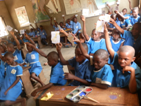 Volunteers under the supervision of the ERuDeF Education for Sustainable Development Coordinator, educate the kids on conservation of great apes; Identify individual projects that could help the community and conservation; tell kids stories and play educative games with them; offer gifts (in form of prizes) to kids after quizzes. This is carried out in primary and secondary schools adjacent the forest and in the communities. There is an evaluation meeting at the end of each day to discus the exercise. During this exercise, they will spend the night in a local hotel or the chief’s palace with very little or no modern facility
Volunteers under the supervision of the ERuDeF Education for Sustainable Development Coordinator, educate the kids on conservation of great apes; Identify individual projects that could help the community and conservation; tell kids stories and play educative games with them; offer gifts (in form of prizes) to kids after quizzes. This is carried out in primary and secondary schools adjacent the forest and in the communities. There is an evaluation meeting at the end of each day to discus the exercise. During this exercise, they will spend the night in a local hotel or the chief’s palace with very little or no modern facility
Day Eight: Meeting with Village Head and Hiking to Base Camp
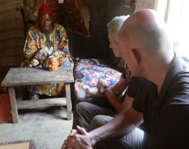 Volunteers/ecotourists and the ERuDeF IVP staff visits the village traditional ruler Traditional blessing/Libation as they are about going into the forest. After this meeting, they ERuDeF IVP staff locates Field Guides and Potters; Volunteers pack their materials in at most 2 bags. They will be given a convenient weight to carry even if it’s not one of their bags. The porters will carry the heaviest bags and they will all hike to the base camp.
Volunteers/ecotourists and the ERuDeF IVP staff visits the village traditional ruler Traditional blessing/Libation as they are about going into the forest. After this meeting, they ERuDeF IVP staff locates Field Guides and Potters; Volunteers pack their materials in at most 2 bags. They will be given a convenient weight to carry even if it’s not one of their bags. The porters will carry the heaviest bags and they will all hike to the base camp.
Volunteers are expected to follow the instructions of the team leader. They could bring along candies or energy bars, which they will consume during the 10mins breaks, during the hike. This exercise takes about two to three hours depending on the pace of the team. At the camp, the ERuDeF IVP with assistance from volunteers mount the tents where they will spend the night for the rest of the tracking period. Everyone takes part in this activity. Volunteers may probably share a tent.
Day Nine to Fifteen: Apes Tracking
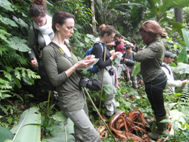 This is the crux of the conservation programme of IVP. It begins with a short training session on survey/data collection techniques and then the tracking proper. During this period the team is expected to;
This is the crux of the conservation programme of IVP. It begins with a short training session on survey/data collection techniques and then the tracking proper. During this period the team is expected to;
-Be quiet during tracking hours
-Follow the field guide accurately
-Ask questions when in doubt
-Take GPS coordinates of apes and human signs
-Follow apes tracks
-Identify apes threats
-Fill data sheets
-Take pictures and videos
-Carry along some energy providing biscuits or candies while tracking· At the end of each tracking day, the team evaluates the signs identified during the days tracking, discuss individual challenges of the day and ways to improve the next day’s hike.
NB: There is only one base camp where the team spend the night and go for tracking
Day Sixteen: Hiking Back to the Community
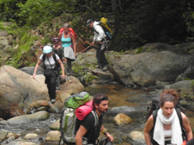 Tents are dismounted with everyone is expected to take part in this activity. The tents are fragile, so they have to be handled with care. The hiking pace may be slower than during the daily surveys because everyone will be carrying heavy bags.
Tents are dismounted with everyone is expected to take part in this activity. The tents are fragile, so they have to be handled with care. The hiking pace may be slower than during the daily surveys because everyone will be carrying heavy bags.
Day Seventeen and Eighteen: School/Community Conservation Education
(Same activities as Day Five to Seven)
Day Nineteen: Hiking to Base Camp
(See Day Eight above)
Day Twenty to twenty Four Apes Tracking
(Same as Day Nine to Fifteen)
Day Twenty Five: Hiking back to the Community and Travelling to Menji.
Day Twenty Six Travelling to Buea and Lodging
Day Twenty Seven: Restitution Meeting/Visit to Limbe Wildlife Center
The restitution meeting is aimed at evaluating the entire expedition taking stock of what went right/wrong and getting recommendations for improvement. During this meeting the volunteers are expected to:
– Share Field experiences
– Share best and worst moments during the program
– Answer questions from audience and ask some(ERuDeF staff)
– Fill evaluation forms
– Discuss recommendations
– Discuss volunteer projects identified on the field.
– Write some form of news – article on their trip
At the end of the restitution meeting, the volunteer(s) and ERuDeF IVP staff visit the Limbe Wildlife Centre home to some 15 primate species including gorillas , chimpanzees, drills, mandrills, baboons monkeys, piton, crocodile, etc in captivity. At this level, volunteers are expected to
· Take pictures of the species at the centre.
· Get a detailed orientation on the centre and the species present.
· Ask questions etc
A farewell lunch of roasted sea fish is organised at the Limbe Down Beach to officially bit farewell to the volunteers. The Wildlife Center and Down Beach have some arts and craft material which volunteers may want to buy as souvenirs.
Day Twenty Eight: Drop Off
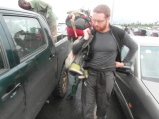 Volunteers are dropped off at the Douala airport (a 2-3hours drive from Buea). If volunteer wishes to stay on or go on a different trip this can be arranged. Volunteers are expected to pay an airport tax of 10,000 FCFA (about $ 20).
Volunteers are dropped off at the Douala airport (a 2-3hours drive from Buea). If volunteer wishes to stay on or go on a different trip this can be arranged. Volunteers are expected to pay an airport tax of 10,000 FCFA (about $ 20).
DATES
(For 2015);
a) The two-week volunteering programme
DATE OF ARRIVAL DATE OF DEPARTURE
January 11, 2015 January 25, 2015
February 8, 2015 February 22, 2015
March 8, 2015 March 22, 2015
April 12, 2015 April 26, 2015
May 10, 2015 May 24, 2015
June 14, 2015 June 28, 2015
July 12, 2015 July 26, 2015
August 9, 2015 August 23, 2015
September 13, 2015 September 27, 2015
October 11, 2015 October 25, 2015
November 8, 2015 November 22, 2015
b) The One Month Volunteering Programme
DATE OF ARRIVAL AND DEPARTURE
January 11, 2015 (Arrival Date Only)
February 8, 2015
March 8, 2015
April 12, 2015
May 10, 2015
June 14, 2015
July 12, 2015
August 9,2015
September 13, 2015
October 11, 2015
November 8, 2015
December 13, 2015 (Departure Date Only)
C) The one month two weeks volunteering programme
DATE OF ARRIVAL DATE OF DEPARTURE
January 11, 2015 February 22, 2015
February 8, 2015 March 22, 2015
March 8, 2015 April 19, 2015
April 12, 2015 May 24, 2015
May 10, 2015 June 21, 2015
June 14, 2015 July 26, 2015
July 12, 2015 August 23, 2015
August 9, 2015 September 20, 2015
September 13, 2015 October 25, 2015
October 11, 2015 November 22, 2015
November 8, 2015 December 20, 2015
NB: Those interested in long term volunteerism/research can send us a mail to volunteerwitherudef@gmail.com or info@erudef.org for date of arrival and departure to be arranged!
COST
2 weeks volunteering = $1020
1 Month Volunteering = $2040
3months = $2553
This cost takes care of;
- Pick up from the airport and drop off after expedition
- 4 nights lodging in a hotel in Buea (2 nights on arrival and 2 on departure)
- Food and water
- Guides and porters
- Transport from Buea to project sites and back
- Local transport circulation within town
- Local communication sim card
NB: Airport taxes paid upon departure (about $ 20), Visa, flights, occasional meals in town, additional travelling etc out of the expedition plan, medical and traveling insurance and medications are not part of this cost.
WHY SHOULD I VOLUNTEER?
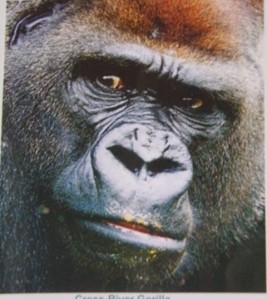 Only 300 Cross River gorilla are left in the world and could become extinct within the next 10 years, if desperate actions are not taking now! Booking a trip to Cameroon and taking part in surveys of the rainforests and in conservation/aware raising campaign in schools and forest adjacent communities will contribute toward saving over 190 cross river gorillas and over 2000 Nigeria Cameroon Chimpanzeees in Cameroon. This will avrert threats which they are exposed to like constant agricultural encroachment (the conversion of forest habitats to farms and plantations), hunting, trapping, growing illegal bush meat market and habitat and great ape population fragmentation due to settlements and roads. . The Programme gives volunteers a feel of conservation realities at the local level; gives them the opportunity to assist in research projects, great apes surveys and attend workshops and meetings with local communities and schools. Volunteers also gain training in great apes surveys and biodiversity monitoring, use of GPS and navigation tools, data collection, and environmental education. Your volunteer contribution also helps to create local jobs in an area where there are virtually no paid jobs available – and to create and maintain new reserves to protect the great apes populations.
Only 300 Cross River gorilla are left in the world and could become extinct within the next 10 years, if desperate actions are not taking now! Booking a trip to Cameroon and taking part in surveys of the rainforests and in conservation/aware raising campaign in schools and forest adjacent communities will contribute toward saving over 190 cross river gorillas and over 2000 Nigeria Cameroon Chimpanzeees in Cameroon. This will avrert threats which they are exposed to like constant agricultural encroachment (the conversion of forest habitats to farms and plantations), hunting, trapping, growing illegal bush meat market and habitat and great ape population fragmentation due to settlements and roads. . The Programme gives volunteers a feel of conservation realities at the local level; gives them the opportunity to assist in research projects, great apes surveys and attend workshops and meetings with local communities and schools. Volunteers also gain training in great apes surveys and biodiversity monitoring, use of GPS and navigation tools, data collection, and environmental education. Your volunteer contribution also helps to create local jobs in an area where there are virtually no paid jobs available – and to create and maintain new reserves to protect the great apes populations.
ELIGIBILITY
No specific qualification is required to be part of any of our projects! but volunteers (18 to 70 years) must be highly motivated and physically fit as the environment is very demanding involving lots of trekking and climbing. No volunteer/eotourist receives less favourable treatment on grounds of race, colour, national or ethnic origin, gender, marital status, sexual orientation, disability, class, age, political or religious belief. Volunteers come from America, Europe, Asia, India, and Australia. Students, workers and any other interested person(s); individual(s) or in group(s), take part in this programme
HOW TO APPLY
Reserve a place for yourself in this expedition by writing us at info@erudef.org and or volunteerwitherudef@gmail.com with your name, contact details, your area of interest, duration and we will send you an application form soonest and our account details for payment. Payment is done 30 before the expedition start date.
WHAT TO TAKE WHEN COMING
These are some suggested stuff you may want to take along while coming to Cameroon for the programme. All may not be applicable to everybody;
Digital Camera
Lightweight, easily erected mosquito net-essential against malaria
Insect repellents
Water purifying tablets/water filter
Dental floss: as well as cleaning your teeth with it, it can double as string, a washing line, can secure a mosquito net, as be used as thread for repairing clothes
Sewing Kit
Disposable razors
Tampons
Contraceptives
Binoculars
Alarm clock
Map distance learning
Torch (flashlight) and spare bulbs and batteries to be used in the jungle, communities and even in the urban areas during electricity cuts
Small towel to be used in the communities/jungle or in town for cheaper hotels that have none
Earplugs for noisy hotels
Calculators for working out exchange rates
Compass
Waterproof bag(s) to protect your luggage especially during the rainy season
Plastic bags
Plastic rain poncho/lightweight windproof waterproof jacket, which can double as a ground mat and is easier tham carrying an umbrella
Hat
Penknife or Swiss Army Knife
CONTACT
Nyenty Building, Malngo Street Buea P. O. Box 189 Buea, SW Cameroon
Email: volunteerwitherudef@gmail.com/info@erudef.org
Tel: (+237 ) 94 92 12 63, 76 24 34 40 and 77 20 33 88
Website: volunteeringwitherudef.wordpress.com and http://www.erudef.org

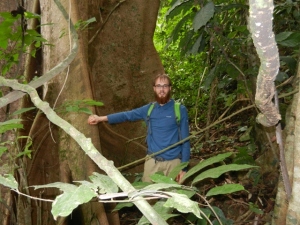
 It was early this year,at dinner time. A team of Biologists/International volunteers from the Environment and
It was early this year,at dinner time. A team of Biologists/International volunteers from the Environment and 